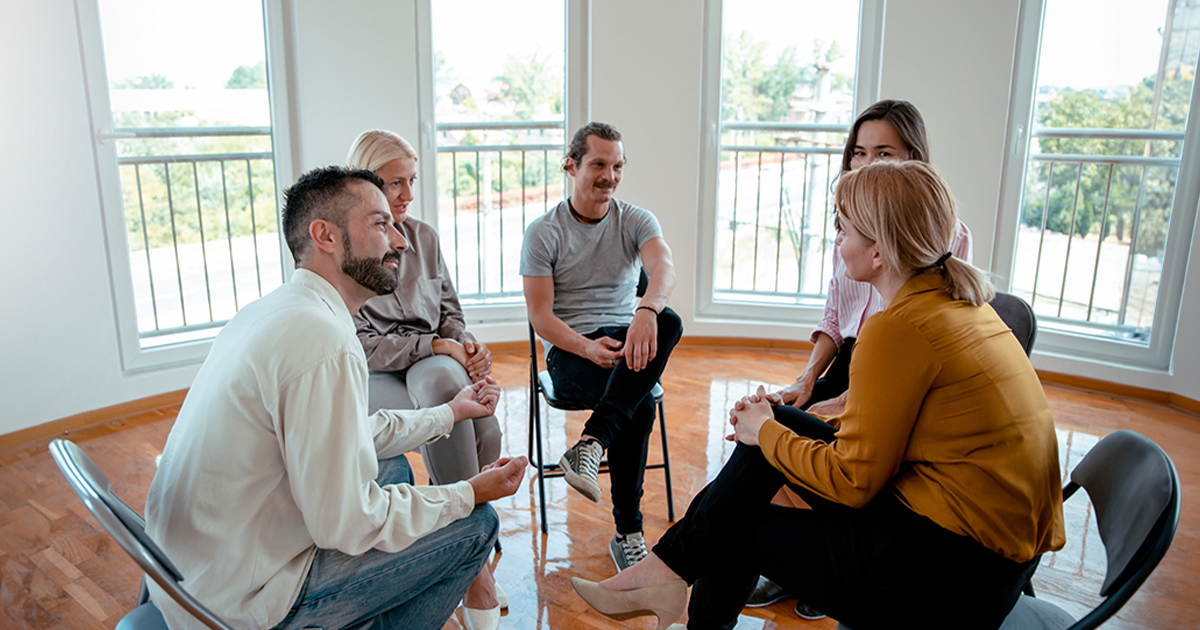Recovery from substance use disorder (SUD) is challenging. That’s especially true if you’ve been dealing with the most severe form. You’ve already taken an important first step in deciding to cut back or get sober. It’s not easy to admit a problem exists or that you need help. It takes a lot of resolve.
The path of recovery has ups and downs. And it looks a little different for everyone. The fixes that work for someone else may not be the best fit for you. And vice versa.
To stay on the right track, you’ll want to surround yourself with people who have your back. They’ll encourage the positive changes you’ve committed to making. And they’ll help you stick with them when times get tough. These people are your recovery support network.
“A recovery support network is equal parts accountability and community,” says Giselle Alexander, LCSW, a licensed therapist and AbleTo program advisor. SUDs want to keep you locked into the same places and people that fueled the old habits that no longer serve you, explains Alexander. “But a recovery support network can help you build new, healthier systems around yourself.”
There are 4 types of people everyone needs in their recovery support network. We’ll walk through each one and discuss why it’s important.

Achieve your mental wellness goals
AbleTo programs give you 24/7 access to tools, activities, and content tailored to your needs. Sign up or log in to start exploring.

Gather your network
1. Health professionals
The first step in any recovery journey should be meeting with a professional, says Alexander. That might be your primary care doctor. Or a psychiatrist. Or even a licensed drug or alcohol counselor. “It’s important that someone with proper training assess your current situation,” she explains. These pros can help you figure out what steps to take. There’s no single solution that will work for everyone. And some substances just aren’t safe to quit cold turkey.
For people with mild or moderate forms of SUD, recovery might involve moderation. Or anti-relapse medications. For those with more severe forms, abstinence might be the way to go.
In all cases, counseling will likely be involved. Mental health providers are also a key source of support. They can help you get to the root of why substances became a crutch in the first place. They can teach you positive ways to manage stress. And they can help you become more flexible in your thinking.
“A therapist or coach can work with you to create a recovery plan,” says Alexander. “If possible, try to find a coach or therapist who specializes in substance use disorder. They’ll have specific insights to help you stay engaged in the process of recovery.”
At AbleTo, therapists and coaches use science-backed techniques to help you identify thoughts, emotions, and behaviors that increase your cravings. That way, you can build new habits to replace the old ones that weren’t serving you.
If cost is a barrier, it’s worth checking which providers might be covered by insurance. Your employer might also offer another way to access mental health benefits like AbleTo. Some providers may also work with you on a sliding scale for their rates.
One good place to start looking for resources is the Substance Abuse and Mental Health Services Administration, which also runs a helpline.
2. Support groups
Research shows that both in-person and virtual groups can help support recovery. The latter can be ideal for people who live in more remote areas, where accessibility may be an issue.
Regardless of which you choose, you’ll meet people facing similar challenges and triggers. “Connecting with others in recovery or sober friends will help you steer clear of situations that increase the possibility of relapse,” says Alexander.
SMART Recovery is a popular community that offers both in-person meetings and digital resources. There are also several anonymous groups, including Alcoholics Anonymous and Narcotics Anonymous, as well as substance-specific groups like Cocaine Anonymous. And, if you served in the military, you can also access services and support through Veterans Affairs.
“Support groups can also be a good place to go if you need a sponsor,” says Alexander. “These are people who have made progress in their recovery. They share their experiences to support another person who is trying to remain sober.” You might naturally click with someone who is ready to take on that role. But it’s okay if you don’t. Often the person leading the meeting will ask if anyone in the meeting would like a sponsor.
One thing to remember as you start to attend meetings: Since these people are also likely struggling, it might take time to bond. And some people might not be as eager to build new relationships. It’s important to be patient with them. And, of course, with yourself.
3. People who share your interests and priorities
Healthy hobbies support your general well-being. That holds true in recovery, too. They can be a positive outlet for our energy and interests. And they help relieve stress that might trigger a relapse. They also allow you to connect with people who share your interests.
“Our addictions may have consumed a lot of our personal time,” says Alexander. “Finding hobbies and interests that support our new values and goals can shift our attention from the addiction. They give us something to look forward to.”
Local recreation and religious centers can be one place to start looking. Café bulletin boards may also advertise events and groups. You can also search for your specific interests on sites like Meetup to connect with interest groups in your area.
4. Supportive friends and family
Loved ones can be powerful allies. But they have to understand your new priorities and what you need to be successful in your recovery. (The college pal who prods you to come out drinking on weekends? Probably not an ideal person to be around right now.)
“At the outset, be selective about whom you ask for support,” says Alexander. She recommends starting with people you’ve stayed in touch with who will positively influence your sobriety. “Ask them for their patience. And let them know you want them to help you stay accountable just as much as you want them to encourage you.”
They may not quite know how to be there for you at first. But you can help them in a few different ways. Be honest about your struggles. And don’t be shy about stating what kind of support you’re looking for. Maybe it’s going to an open support group meeting. Or trying out a new hobby. Remember: These people truly want to have your back. They don’t think of it as imposing.
If a friend or family member reaches out to you first, you might struggle to reply. That can be especially true if you acted in ways you regret while you were in the thick of your addiction. It’s important to learn how to sit with those tough emotions and not let them keep you from accepting support. Give yourself permission to name and feel your feelings. A journal, like AbleTo’s Freewrite Journal, can act as a safe space to process whatever’s on your mind.
You are worthy of support
There may be a part of your old self that resists the idea of creating a support network. Or wonders who would actually want to be there for you in your recovery. In reality, there are so many people who want to see you succeed in creating a healthy life for yourself. They want to see you thrive. And they understand that there will be ups and downs along the way.
“Relapse is understood to be a part of recovery,” says Alexander. “No one is perfect. Slip-ups give us a chance to reflect on what triggered us to relapse. Then we can develop additional coping skills and internal resources. And, of course, to tap into our support network.”
Need some support?
AbleTo is here to help. From on-demand self care to virtual therapy and coaching, we make managing your mental wellness easy. Sign up and get the personalized support you deserve.
By Sarah Bruning
Sarah Bruning has been a journalist and content strategist for more than 15 years. Her work has appeared in leading publications including Women’s Health, Travel + Leisure, and Cosmopolitan.
Clinically reviewed by Hayley Quinn, PsyD.
Stock photos by Biserka Stojanovic/iStock. Posed by models.
The information featured on this site is general in nature. The site provides health information designed to complement your personal health management. It does not provide medical advice or health services and is not meant to replace professional advice or imply coverage of specific clinical services or products. The inclusion of links to other websites does not imply any endorsement of the material on such websites.


